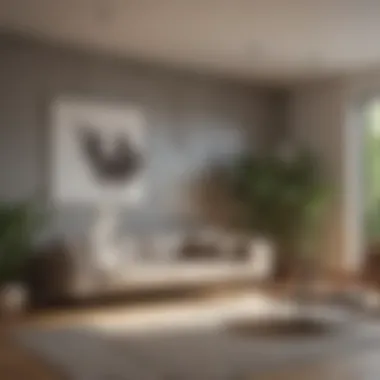The Art of Simplifying: Your Comprehensive Guide to Decluttering


Interior Design Tips
Embark on a journey to transform your living space with the latest interior design tips. Explore trendy design ideas that blend seamlessly with modern aesthetics. Dive into various color schemes and combinations to create a harmonious ambiance within your home. Discover innovative furniture arrangement techniques that optimize space and functionality, fostering an atmosphere of both style and comfort.
Entertaining Essentials
Prepare to elevate your hosting game with essential tips for entertaining guests. Delve into table setting inspirations that add elegance to your dining experience. Uncover menu planning strategies that cater to diverse tastes and dietary preferences, ensuring a memorable gathering for all. Consider unique party theme suggestions to infuse creativity and fun into your events, setting the stage for unforgettable moments.
Gardening Know-How
Immerse yourself in the world of gardening with expert advice and practical tips. Gain insights into plant care guides that promote healthy growth and blooming. Explore seasonal gardening tips to enhance the beauty of your outdoor spaces year-round. Engage in DIY garden projects that foster a sense of ownership and accomplishment, transforming your surroundings into vibrant retreats of natural beauty.
Inspirational Home Decor
Unleash your creativity through inspirational home decor ideas that reflect your personal style. Discover a curated collection of stylish decor pieces that add character and charm to every room. Explore diverse options for wall art and prints that serve as focal points, infusing each space with individuality. Master the art of lighting and ambiance creation, setting the mood for relaxation and rejuvenation within your home sanctuary.
Outdoor Living Spaces
Step into the realm of outdoor living and embrace the beauty of nature in your own curated oasis. Find inspiration for patio designs that harmonize with your outdoor surroundings, creating a seamless transition from indoor comfort to outdoor allure. Stay updated on outdoor furniture trends that blend durability with style, offering both functionality and aesthetics. Learn the art of creating cozy outdoor retreats that beckon you to unwind and indulge in the splendor of alfresco living.
Introduction
In the modern age of material abundance and consumerism, the art of decluttering holds significance beyond merely tidying up physical spaces. It encompasses a deeper essence of simplifying our lives by consciously choosing what surrounds us. This article delves into the profound impact of decluttering and how it can transform not only our homes but also our mental and emotional well-being, offering a roadmap to a more tranquil and organized lifestyle.
Understanding the Importance of Decluttering
Benefits of Simplifying Your Space
When we streamline our living environment by decluttering, we pave the way for a myriad of benefits that extend beyond aesthetics. Simplifying our space allows us to focus on what truly matters, reducing distractions and promoting a sense of clarity. This deliberate act of minimizing possessions can enhance productivity, foster creativity, and instill a sense of control over our surroundings, ultimately leading to a more balanced and harmonious life.
Impact on Mental Well-being
Our living environment significantly impacts our mental well-being, and clutter can act as a silent but potent stressor. By decluttering and creating an organized space, we invite peace and tranquility into our lives. A clutter-free environment can promote relaxation, reduce feelings of overwhelm, and create a sanctuary where we can unwind and rejuvenate our minds. Embracing decluttering as a tool for enhancing mental well-being empowers us to nurture a positive relationship with our surroundings, fostering mental clarity and emotional balance.
Creating a Calm and Serene Environment
A calm and serene environment is not merely a visual aesthetic but a profound state of being that decluttering can help cultivate. A clutter-free space allows for better air circulation, improved energy flow, and enhanced mindfulness. By eliminating excessive items and organizing strategically, we create a sanctuary where stress dissipates, and peace reigns. This peaceful ambiance can have a ripple effect on our overall well-being, promoting relaxation, positive mood, and a deep sense of contentment.
Setting the Right Mindset
Embracing Minimalism


Embracing minimalism goes beyond a design trend; it is a mindset shift towards intentional living and conscious consumption. By focusing on essentials and letting go of excess, we can curate a living space that reflects our values and priorities. Minimalism encourages us to be mindful of what we own, choosing quality over quantity, and seeking fulfillment in experiences rather than possessions. This mindset shift empowers us to break free from societal pressures of accumulation and find contentment in simplicity.
Letting Go of Emotional Attachments
Letting go of emotional attachments to possessions is a crucial aspect of decluttering that requires introspection and emotional intelligence. Our belongings often carry memories, attachments, and identities, making it challenging to part with them. However, by acknowledging that our worth is not defined by material possessions, we can release emotional baggage and create a space for new beginnings. Letting go fosters growth, resilience, and emotional clarity, enriching our lives beyond materialistic measures.
Committing to a Clutter-Free Lifestyle
Committing to a clutter-free lifestyle is a commitment to self-care and mindful living. It involves cultivating habits that prioritize organization, conscious consumption, and intentional decision-making. By embracing a clutter-free lifestyle, we create space for what truly matters, be it relationships, experiences, or personal growth. This commitment enables us to break free from the cycle of accumulation, find fulfillment in simplicity, and nurture a lifestyle that honors our well-being and values.
Practical Steps to Declutter
Sorting and Categorizing Belongings
The first step towards decluttering is sorting and categorizing belongings based on utility, relevance, and sentimental value. By systematically organizing items into categories, we gain clarity on what to keep, donate, or discard. This process enables us to declutter efficiently, making informed decisions about the possessions that align with our vision for an organized living space.
Implementing the Kon
Mari Method ###
The Kon Mari Method, popularized by Marie Kondo, offers a systematic approach to decluttering based on sparking joy and respecting belongings. By assessing each item's emotional significance and decluttering by category, we can hone our intuition and create a space filled only with items that bring us joy and purpose. This method encourages mindfulness, gratitude, and a deeper connection with our possessions, transforming decluttering into a transformative and enriching experience.
Utilizing Storage Solutions Effectively
Effective utilization of storage solutions is key to maintaining a clutter-free environment in the long term. By investing in storage solutions that align with our space and lifestyle, we can optimize organization and accessibility. From multifunctional furniture to concealed storage units, harnessing storage solutions thoughtfully streamlines our living space, maximizing functionality without compromising aesthetics. This strategic approach to storage fosters a seamless and visually pleasing environment, ensuring sustainability in our decluttering journey.
Embracing Minimalism
In this section, we delve into the pivotal concept of minimalism, shedding light on why it plays a crucial role in the quest for decluttering and simplifying living spaces. Embracing minimalism transcends mere physical decluttering; it fosters a mindset shift towards prioritizing what truly matters in our surroundings. By focusing on quality over quantity, individuals pave the way for a more intentional and curated living environment. Minimalism champions the idea of owning only what adds value and joy, leading to a streamlined and harmonious space devoid of excess and unnecessary distractions. Embracing minimalism calls for a deliberate reconsideration of consumerist impulses and the cultivation of a more mindful and purpose-driven lifestyle. Through deliberate choices and conscious consumer behavior, individuals can forge a deeper connection with their possessions and curate spaces that resonate with their essence.
Defining Your Essentials
Identifying Needs vs. Wants
Within the realm of decluttering and embracing minimalism, distinguishing between needs and wants holds significant importance. Identifying needs involves recognizing the essential elements required for functionality and comfort within a living space, stripping away superfluous possessions to reveal the core necessities. In contrast, understanding wants pertains to acknowledging the desires and non-essential items that often contribute to clutter and overwhelm in a space. By delineating needs from wants, individuals can adopt a more discerning approach to consumption, prioritizing items based on utility and genuine purpose.
Prioritizing Functionality over Excess
Prioritizing functionality over excess entails selecting items and furniture pieces that serve a practical purpose while minimizing unnecessary embellishments or redundancies. This approach not only optimizes space utilization but also enhances the efficiency and usability of each item within a room. By prioritizing functionality, individuals can cultivate a space that caters to their daily activities and routines seamlessly, promoting ease and convenience in their living environment.
Curating a Personalized and Purposeful Space


Curating a personalized and purposeful space involves infusing one's personality and values into the design and layout of a living area. By deliberately selecting decor elements, furnishings, and artwork that resonate with individual taste and style, one can transform a space into a reflection of their identity. This curated approach ensures that each item holds significance and contributes to the overall narrative of the space, fostering a sense of connection and personalization that transcends mere aesthetics.
Streamlining Your Living Areas
In the pursuit of simplifying living spaces, streamlining the arrangement and composition of various areas becomes paramount. Optimal furniture arrangement plays a vital role in maximizing space functionality and flow, ensuring each piece serves its purpose without overcrowding or obstructing the room's layout. Creating a sense of openness and flow involves strategic placement of furniture and decor to encourage a seamless transition between different areas, promoting a harmonious and spacious ambiance. Furthermore, incorporating sustainable and versatile pieces adds a layer of eco-consciousness and adaptability to the living space, fostering a mindful approach to consumption and design.
Sustainable Consumption Practices
The adoption of sustainable consumption practices forms the bedrock of a minimalist and eco-conscious lifestyle. Mindful buying habits advocate for thoughtful and intentional purchases that align with personal values and sustainability principles. Supporting ethical and eco-friendly brands not only ensures products adhere to environmental and ethical standards but also contributes to a larger movement towards a greener and more responsible consumer culture. Reducing waste and environmental impact involves minimizing disposable items, opting for reusable and recyclable alternatives, and actively participating in initiatives that promote waste reduction and resource conservation. These practices not only benefit the environment but also cultivate a sense of responsibility and mindfulness in everyday consumption choices.
Psychological Insights
In this article, we delve into the crucial aspects of psychological insights concerning decluttering and simplifying living spaces. Understanding the profound impact of decluttering on psychological well-being is essential. By decluttering, individuals can experience a range of benefits, from creating a sense of mental clarity to fostering a calm and serene environment. The act of simplifying your living space not only transforms the physical surroundings but also has a significant positive influence on one's mental state. Embracing minimalism and decluttering can lead to reduced stress levels and enhanced overall mental health.
Emotional Attachments to Possessions
Understanding Clutter as Emotional Baggage
A key element of decluttering is recognizing clutter as emotional baggage. This aspect underscores the emotional connections individuals often have with their possessions. Understanding clutter as emotional baggage involves acknowledging the attachment we form with items and how they can impact our mental and emotional well-being. Recognizing this connection is vital in the decluttering process as it allows individuals to evaluate their possessions thoughtfully.
Overcoming Hoarding Tendencies
Overcoming hoarding tendencies plays a crucial role in the journey towards simplifying living spaces. Hoarding tendencies can impede the decluttering process, making it challenging to let go of unnecessary items. By addressing and overcoming these tendencies, individuals can create a more organized and functional living environment. Recognizing the reasons behind hoarding tendencies and implementing practical steps to address them are essential in achieving long-term decluttering success.
Seeking Professional Support if Needed
In some instances, seeking professional support may be necessary to navigate the complexities of decluttering effectively. Professional organizers or therapists specializing in hoarding disorders can provide valuable guidance and assistance. By seeking professional support when needed, individuals can overcome challenging emotional barriers and adopt healthier decluttering practices. Professional support can offer personalized strategies to address specific decluttering challenges, ensuring a successful and sustainable outcome.
Mindful Consumption Habits
Avoiding Impulse Purchases
Avoiding impulse purchases is a fundamental aspect of embracing mindful consumption habits. Impulse buying contributes to clutter accumulation and hinders efforts to maintain a minimalist lifestyle. By exercising restraint and mindful decision-making when making purchases, individuals can prevent unnecessary clutter and promote a more intentional approach to consumption.
Practicing Gratitude and Contentment
Practicing gratitude and contentment cultivates a mindset of appreciation for what one already has, reducing the desire for excessive consumption. By focusing on gratitude for existing possessions and experiences, individuals can find fulfillment in simplicity and authenticity. This mindful approach to consumption shifts the focus from material goods to intrinsic values, fostering contentment and emotional well-being.
Investing in Experiences over Material Goods
Investing in experiences over material goods shifts the emphasis from acquiring possessions to creating meaningful memories. Experiential investments offer lasting value and fulfillment, promoting a minimalist lifestyle focused on personal growth and enrichment. By prioritizing experiences that enrich life experiences, individuals can lead a more purposeful and fulfilling existence, free from the burden of excessive material possessions.


Impact on Well-being
Enhanced Focus and Productivity
Decluttering and simplifying living spaces contribute to enhanced focus and productivity. An organized environment minimizes distractions and promotes mental clarity, enabling individuals to concentrate on tasks more effectively. By creating a clutter-free space, individuals can enhance their focus, work efficiency, and overall productivity levels.
Reduced Stress and Anxiety Levels
Reducing stress and anxiety levels is a significant benefit of decluttering and simplifying living spaces. Cluttered environments can induce feelings of overwhelm and anxiety, negatively impacting mental well-being. By decluttering, individuals can create a calming atmosphere that promotes relaxation and reduces stress levels. Maintaining an organized living space fosters a sense of tranquility and peace, contributing to improved emotional health.
Promoting Peaceful Sleep Patterns
Promoting peaceful sleep patterns is another positive outcome of decluttering and simplifying living spaces. An uncluttered bedroom creates a serene and tranquil environment that is conducive to quality sleep. By removing excess items and distractions from the sleeping area, individuals can establish a peaceful bedtime routine and improve overall sleep quality. The act of decluttering not only enhances the physical space but also paves the way for restful and rejuvenating sleep.
Sustainable Practices
In the realm of decluttering and simplifying living spaces, the incorporation of sustainable practices holds significant relevance. By embracing sustainability, individuals not only contribute to environmental preservation but also foster responsible consumption habits. The practice of recycling and upcycling plays a pivotal role in this context. It involves repurposing items creatively, breathing new life into objects that would otherwise be discarded. This approach not only minimizes waste but also encourages the utilization of resources already in circulation, thereby reducing the strain on the environment. Supporting circular economy initiatives further bolsters sustainability efforts, emphasizing the importance of closed-loop systems where resources are reused and recycled efficiently. By reducing the carbon footprint through reuse, individuals actively participate in mitigating environmental impact, promoting a greener and more eco-conscious lifestyle.
Recycling and Upcycling
Repurposing Items Creatively
Repurposing items creatively is a cornerstone of sustainable practices within the decluttering domain. This process involves transforming old or unused items into functional or decorative pieces, offering a unique blend of utility and aesthetic appeal. The key characteristic of repurposing lies in its ability to breathe new life into objects, adding a personalized touch to living spaces. This approach is particularly beneficial as it promotes resourcefulness and reduces waste, aligning with the principles of minimalism and sustainability. While repurposing items creatively requires creativity and vision, its advantages lie in its ability to add personality to spaces and contribute to a more environmentally conscious lifestyle.
Supporting Circular Economy Initiatives
Engaging in circular economy initiatives is a proactive step towards sustainable living practices. By supporting circular models where resources are reused, recycled, and repurposed, individuals actively contribute to waste reduction and resource conservation. The key characteristic of circular economy initiatives is their focus on closing the loop of resource utilization, minimizing the need for new raw materials and mitigating waste generation. This approach is not only beneficial for the environment but also aligns with the ethos of decluttering by promoting intentional consumption and mindful disposal practices. By endorsing circular economy initiatives, individuals play a vital role in building a more sustainable future.
Reducing Carbon Footprint through Reuse
Reducing the carbon footprint through reuse is a fundamental aspect of sustainable decluttering practices. By choosing to repurpose and reuse items instead of discarding them, individuals contribute to resource conservation and energy efficiency. The key characteristic of this practice lies in its direct impact on lowering greenhouse gas emissions and minimizing environmental harm. By extending the lifespan of products through reuse, individuals decrease the demand for new production, thus reducing the overall carbon footprint. This approach not only benefits the environment but also cultivates a mindset of responsible consumption and ecological stewardship, essential components of a sustainable lifestyle.
Conclusion
In this article, the importance of commitment to a clutter-free lifestyle cannot be overstated. Decluttering is more than just removing physical objects; it is a psychological and emotional process that can significantly impact one's well-being and quality of life. By embracing a clutter-free lifestyle, individuals can create a harmonious and tranquil living environment that promotes focus, productivity, and relaxation. Celebrating progress and small wins along the decluttering journey is essential as it serves as motivation and reinforcement for sustaining positive habits. Recognizing even the smallest achievements can boost morale and inspire further decluttering efforts. It is crucial to maintain consistency and discipline in decluttering practices to prevent a relapse into chaos. By establishing consistent routines and adhering to organizational strategies, individuals can effectively manage their belongings and cultivate a clutter-free space in the long term. Enjoying the benefits of simplifying your space is the ultimate reward for committing to a clutter-free lifestyle. From experiencing a sense of freedom and clarity to enjoying a more aesthetically pleasing environment, the rewards of decluttering are both tangible and intangible.
Committing to a Clutter-Free Lifestyle
Celebrating Progress and Small Wins
Celebrating progress and small wins is a crucial aspect of the decluttering process. It involves acknowledging and appreciating the incremental steps taken towards a clutter-free environment. By recognizing each accomplishment, individuals can stay motivated and focused on their end goal. The key characteristic of celebrating progress is its ability to inspire a sense of achievement and satisfaction, boosting morale and sustaining momentum. This positive reinforcement serves as a powerful incentive to continue decluttering efforts. While celebrating progress is a popular choice for maintaining motivation, it is essential to strike a balance to avoid complacency and ensure ongoing progress.
Maintaining Consistency and Discipline
Maintaining consistency and discipline in decluttering practices is vital for long-term success. Consistency involves establishing regular decluttering routines and habits to prevent clutter from accumulating. Discipline, on the other hand, requires self-control and commitment to organizational strategies. The key characteristic of consistency and discipline is their ability to cultivate order and simplicity in one's living space. By staying true to decluttering principles and maintaining a clear focus, individuals can avoid reverting to old habits and uphold a clutter-free environment. While consistency and discipline may require effort and determination, the benefits outweigh the challenges, resulting in a more organized and stress-free lifestyle.
Enjoying the Benefits of Simplifying Your Space
Enjoying the benefits of simplifying your space is the ultimate goal of committing to a clutter-free lifestyle. By decluttering and organizing your home, you can experience a myriad of benefits, including increased productivity, enhanced relaxation, and improved overall well-being. The key characteristic of enjoying these benefits is the tangible impact on daily life, from reduced stress levels to heightened creativity. Embracing a clutter-free environment also fosters a sense of pride and satisfaction, contributing to a positive self-image. While there are numerous advantages to simplifying your space, it is essential to remember that decluttering is a continuous process that requires ongoing commitment and dedication for long-lasting results.







